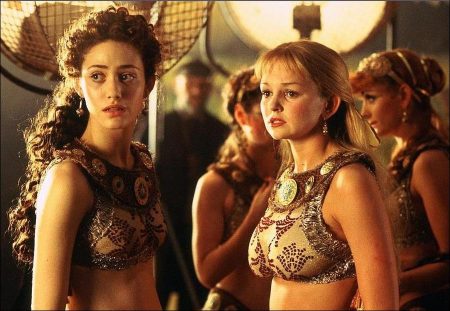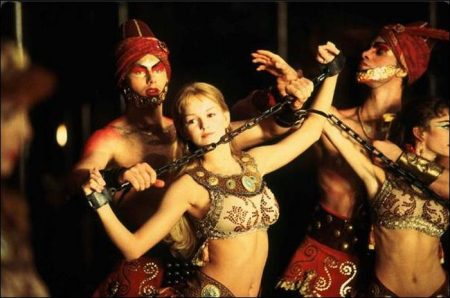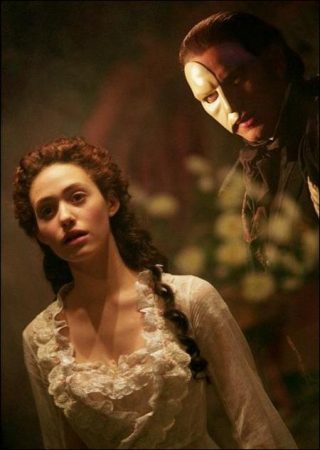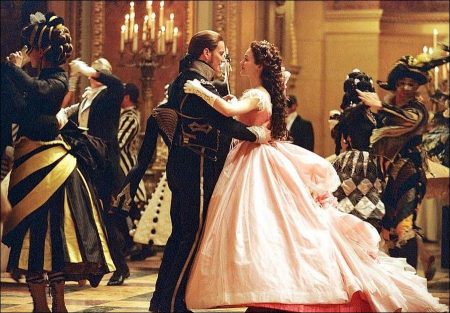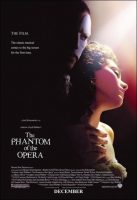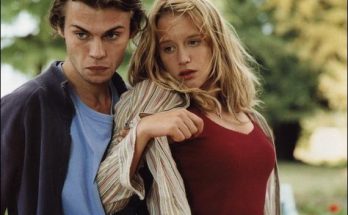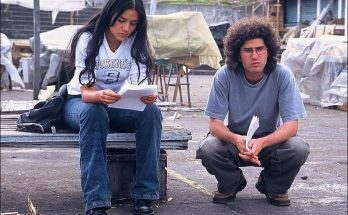Tagline: The world’s biggest musical!
Andrew Lloyd Webber’s The Phantom of the Opera tells the story of a disfigured musical genius (Gerard Butler) who haunts the catacombs beneath the Paris Opera, waging a reign of terror over its occupants. When he falls fatally in love with the lovely Christine (Emmy Rossum), the Phantom devotes himself to creating a new star for the Opera, exerting a strange sense of control over the young soprano as he nurtures her extraordinary talents.
His voice calls to her, nurturing her extraordinary talents from the shadows of the opera house where innocent chorus girl Christine Daae (Emmy Rossum) makes her home. Only ballet mistress Madame Giry (Miranda Richardson) knows that Christine’s mysterious “Angel of Music’ is actually the Phantom (Gerard Butler), a disfigured musical genius who haunts the catacombs of the theatre, terrifying the ensemble of artists who live and work there.
When temperamental diva La Carlotta (Minnie Driver) walks out in the middle of a dress rehearsal for the company’s latest production, the theatre’s eager new managers (Simon Callow and Ciaran Hinds) have no choice but to thrust Christine into the spotlight. Her mesmerizing opening night performance captivates both the audience and the Phantom, who devotes himself to casting his protégé as the opera’s next star.
But he is not the only powerful man to be awed by the young soprano, as Christine soon finds herself courted by the theatre’s wealthy patron, the Vicompte Raoul de Chagny. Though she is enthralled by her charismatic mentor, Christine is undeniably drawn to the dashing Raoul, enraging the Phantom and setting the stage for a dramatic crescendo in which soaring passions, fierce jealousies and obsessive love threaten to drive the fated lovers past the point of no return.
15 Years in the Making
This holiday season, Andrew Lloyd Webber, director Joel Schumacher and Warner Bros. Pictures will proudly present The Phantom of the Opera, the highly anticipated film adaptation of Andrew Lloyd Webber’s celebrated stage musical.
Based on Gaston Leroux’s novel The Phantom of the Opera, Lloyd Webber’s musical phenomenon is the largest grossing stage or screen production in the world, having garnered worldwide box office receipts over $3.2 billion.
Since its debut in London’s West End at Her Majesty’s Theatre on October 9, 1986, the enduringly popular musical has reached an estimated audience of 80 million people. More than 65,000 performances of Phantom have been staged for theatergoers in 18 countries around the world. In August of 2003, the show marked its 7000th performance. Productions of Phantom have earned over 50 major awards, including three Olivier Awards, seven Tony Awards, seven Drama Desk Awards and three Outer Critic’s Circle Awards.
A testament to Phantom’s enduring popularity is a plan, currently in the works, for a permanent theatrical installation of the musical, to be housed at the Venetian hotel-casino in Las Vegas, Nevada. In the spring of 2006, a 90-minute version of the show will open in a brand new, $25 million state-of-the-art theatre, designed and built specifically for the musical production. The Venetian’s Phantom will boast a ground-breaking series of cutting-edge special effects, including an onstage lake and an exploding replica of the Paris Opera House chandelier.
Long awaited by Phantom fans, director Joel Schumacher’s sumptuous film adaptation takes audiences beyond the boundaries of theatre and immerses them in a vibrant world of high romance, soaring music, riveting suspense and drama, while introducing the powerfully compelling story to a new generation of movie-goers.
Originally published in 1911, Leroux’s novel has inspired numerous film and television versions of the bewitching tale, which tells of a disfigured musical genius who haunts the catacombs of Paris’ preeminent opera house and finds himself transfixed by Christine, his beguiling young muse. “Andrew’s version presents the Phantom as more of a tragic lover and a sensitive romantic, not just a creature of horror to be feared,” Schumacher observes. “He also made the Phantom’s relationship with Christine much more of a love affair than it is in the original story.”
“Phantom is a very personal piece in my career,” says Lloyd Webber, the legendary producer-composer of such renowned musicals as Jesus Christ Superstar, Evita, Cats, Joseph and the Amazing Technicolor Dreamcoat, Starlight Express, Aspects of Love and Sunset Boulevard. He is also the recipient of seven Tony awards, three Grammys, a Golden Globe and an Academy Award (for Evita).
After taking Phantom to Broadway in 1988, Lloyd Webber approached Schumacher about helming a feature film version of the musical, having been impressed by the director’s blockbuster vampire thriller The Lost Boys. “I thought Joel had an incredible visual sense and his use of music in the film was exceptional,” Lloyd Webber recalls. “One of the great joys of collaborating with Joel is that he has a great ear for music; he really gets it, he understands how the music drives the story.”
In the wake of his divorce from Phantom star Sarah Brightman, the talented singeractress who originated the role of Christine and served as Lloyd Webber’s muse during the creation of the musical, the composer decided to postpone production of the film. At various stages in the years following, Lloyd Webber asked Schumacher to collaborate on the adaptation, but the director was unavailable, busily helming a diverse array of hit films including Batman Forever, A Time To Kill, The Client, Falling Down and Phone Booth.
Fate and good timing finally collided in December 2002, when the old friends met for dinner in London and Lloyd Webber proposed they join forces to launch the long-awaited production. “I had just done a series of gritty, more experimental films than the mainstream blockbusters I’d been associated with in the past,” Schumacher says of his films 8mm, Flawless, Tigerland, Veronica Guerin and Phone Booth, which he shot in a mere twelve days. “Phantom seemed as far from twelve days in a phone booth as I could get.”
Schumacher says it was the Phantom characters that initially attracted him to the “extraordinarily cinematic” project in 1988, and drew him back to it once again. “One of the reasons this tragic love story has been part of our culture since Gaston Leroux wrote his novel is because we identify with the Phantom,” he believes. “The Phantom is a physical manifestation of whatever human beings feel is unlovable about themselves. He is a heartbreaking character – much like the hunchback of Notre Dame and the Beast in Beauty and the Beast.”
The director was also compelled to make the film because “there are millions of people who cannot afford to see Phantom in a legitimate theatre, and people don’t live in an area where they can get to a theatre where musical is playing. Think about films like The Sound of Music, West Side Story and Chicago. How many people have actually seen The Sound of Music on the stage, compared to the millions who have seen the film? There are people who love Andrew’s music, and people who have always wanted to see Phantom onstage.”
In adapting their screenplay from the musical’s book, Schumacher and Lloyd Webber delved further into the backstories of several key characters and incorporated the backstage world of the opera house into the main story. “In the stage musical, we touch on the Phantom’s childhood, but we don’t visually go back in time to explore it as we do in the film,” Lloyd Webber explains. “It’s a very important change for us, because it makes the Phantom’s plight even more understandable.”
“The stage show concentrates on the Phantom, Christine and Raoul,” Schumacher elaborates. “Not only did we want to give the audience more insight as to how each of these characters arrived at the opera house, we also wove the backstage activity – the plasterers, prop makers, wig makers, scenic artists, dancers and singers – into the fabric of the story.”
Schumacher attributes his rewarding collaboration with Lloyd Webber to a mutual trust and respect developed over the course of their fifteen year friendship. “We have a very good marriage creatively because I take care of the filming and he takes care of the music,” he explains. “Like a lot of very intelligent people, Andrew doesn’t pretend to know about things he doesn’t. He’s an expert on music, so he focused his brilliant talent on the musical aspects of the film, and he gave me an enormous amount of freedom and his full support to create what I thought should be done with the material.”
For Lloyd Webber, the long-awaited adaptation of his deeply personal theatre phenomenon has yielded truly satisfying results. “The film looks and sounds fabulous and I think it’s an extraordinarily fine document of the stage show,” he enthuses. “While it doesn’t deviate much from the stage material, the film has given it an even deeper emotional center. It’s not based on the theatre visually or direction-wise, but it’s still got exactly the same essence. And that’s all I could have ever hoped for.”
The Phantom of the Opera (2004)
Directed by: Joel Schumacher
Starring: Gerard Butler, Emmy Rossum, Patrick Wilson, Miranda Richardson, Simon Callow, Ciarán Hinds, Minnie Driver, Jennifer Ellison, Ramin Karimloo
Screenplay by: Andrew Lloyd Webber, Joel Schumacher
Production Design by: Anthony Pratt
Cinematography by: John Mathieson
Film Editing by: Terry Rawlings
Costume Design by: Alexandra Byrne
Set Decoration by: Celia Bobak
Art Direction by: John Fenner, Paul Kirby
Music by: Andrew Lloyd Webber
MPAA Rating: PG-13 for violent images.
Distributor: Warner Bros. Pictures
Release Date: December 22, 2004
Views: 94
